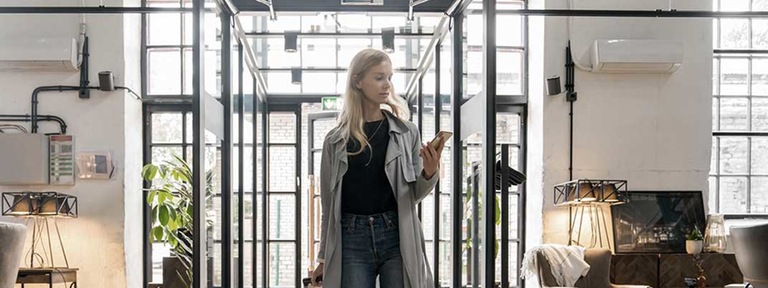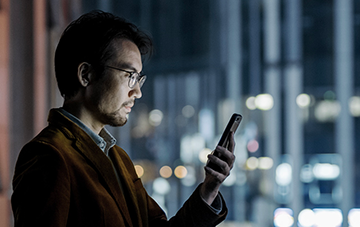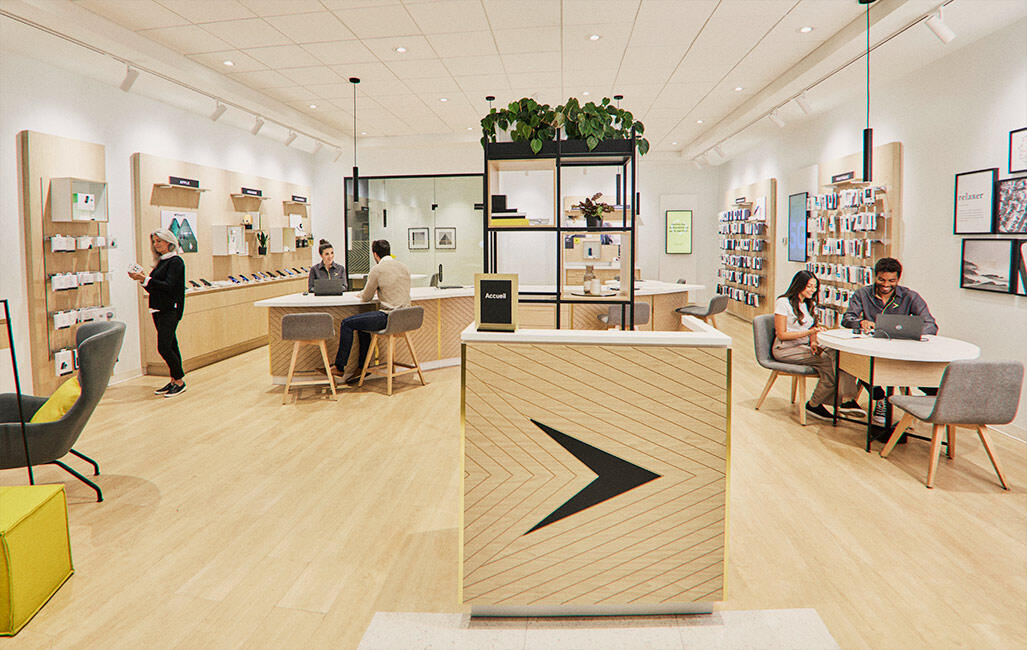
The coming years will be full of challenges, but one of them is already making its presence felt: the labour shortage. This issue affects a number of industries, the hospitality industry being just one among them. But connected devices that are able to optimize guests’ comfort, ensure quick check-in, and lighten the load for employees may help remedy the reduction in manpower.
When travellers reserve a night’s stay at The Annex, a boutique hotel in Toronto, they have the option to not interact with any hotel staff if that is their preference. Even before their arrival, as soon as their room has been cleaned, they receive a code that unlocks their room. If they have any questions, they simply send a text to hotel staff. And this is just one small aspect of the hotel’s use of technology that is actually visible to customers. Launched in 2018, The Annex makes use of omnipresent technology, from iPads in hotel rooms to the management of cleaning services.
Automation at The Annex is made possible by the Internet of Things, the term used for an array of devices connected through the Internet, from Internet-enabled thermostats to smart watches.
According to estimates, there are some 10 billion to 45 billion such devices in circulation, depending on the source. In the hotel business, these devices can be connected together to create a more efficient chain of operations and to reduce operating costs. “It’s also a way of enhancing customer experience, and therefore for increasing customer loyalty and differentiating yourself within a competitive industry,” states Bruno Crispin, Product and Strategy Director of Mobility Solutions & Business IoT at Videotron Business.
An occupancy detector, for example, can alert the main control system when a cleaner leaves a room. The new code to unlock the room is automatically programmed into the connected lock and sent to the customer. The system then indicates to the thermostat to adjust the temperature based on the guest’s preferences (if this information was recorded in the CRM after their previous visit). All connected devices work together towards the same goal: serving the customer as quickly and efficiently as possible.
And it’s not just trendy new hotels that have been pursuing a digital transformation in recent years. Seventy percent of managers in the hotel sector are currently working on projects involving the Internet of Things, according to a study by consulting firm PwC published before the pandemic. Since then, the trend has likely only increased.
“Like a lot of other places, the pandemic has been a catalyst driving the use of the Internet of Things in the hospitality industry,” explains Crispin. The crisis has exacerbated a number of already-existing problems, particularly related to the labour shortage. In many cases, the technology offered today can resolve hotel managers’ issues and enable them to regain profitability.
“Like a lot of other places, the pandemic has been a catalyst driving the use of the Internet of Things in the hospitality industry,” explains Crispin. The crisis has exacerbated a number of already-existing problems, particularly related to the labour shortage. In many cases, the technology offered today can resolve hotel managers’ issues and enable them to regain profitability.
10 IoT uses in the hotel business
1. Improved valet parking
Samsung’s ALICE Hotel Operations Platform equips certain hotel employees with smart watches to enable them to transmit information quickly and discreetly, so that employees don’t have to check their smartphones in front of customers or use noisy handheld radio transceivers.
With a smart watch, a valet can receive a notification as soon as a new customer arrives at the hotel, or when they are leaving the hotel, in order to greet them when they’re needed. “Using such connected IoT watch devices isn’t at the expense of human contact. In this case, it ensures there’s a human presence available at the right time,” notes Crispin.
2. Smart parking
Hotel parking can take advantage of the Internet of Things even if it doesn’t offer valet service. Instead of giving customers archaic little cards, a variety of sensors and cameras allow the hotel to know not just exactly where a car has been parked, but also when its owner arrives on the premises.
This type of system can be used to automate billing, personalize customer service upon arrival, or even allot specific spaces so that customers do not have to search in vain when trying to remember where they parked their car. In urban centres, real-time tracking of parking spaces can also be a great opportunity for increasing revenue by temporarily renting unused spaces to the public, for example.
3. Smart buildings
It’s not just individual homes that can be made intelligent, but also entire commercial buildings. Lighting, room temperature, ventilation… Practically everything can be controlled automatically.
An occupancy detector (a technology that works without a camera and therefore respects your customers’ privacy) can turn off the lights in a room when no one is there. And by heating or cooling only rented rooms, for example, a hotel can also reduce its energy consumption. Automating these operations also partly frees up employees’ time, letting them concentrate on other tasks.
4. Tracking food
The Internet of Things also has a role to play in hotel kitchens. As with the transportation industry, connected temperature sensors can be used to ensure cold chain compliance is respected.
It’s also possible to minimize energy losses by installing sensors that can send an alert when a refrigerator door has been open for too long. Some hotels can also make use of connected devices to track inventory levels, automatically alerting employees when it’s time to restock the storeroom.
5. Connected screens for automated check-in
There are already a number of automated customer check-in technologies available. Québec company Virtual Front Desk, for example, offers hotels connected screens that can be used by customers to check in or out, access information, or pay for their stay. The screen can also be paired with an RFID card reader (which enables the customer to manage their own room key) and a printer to provide a receipt after the transaction.
The screen can additionally even be used directly within rooms or installed by floor. Customers can use the screens to place videocalls to the concierge if they need trip suggestions or to ask restaurant personnel about the day’s menu.
6. A 100% mobile experience
For customers who prefer quick, contact-free service, there are a number of services that can be provided directly through their smartphone.
This is particularly true for RFID cards, which can be replaced by using the NFC chip of their Android phone or iPhone. The user only needs to place their phone or smart watch in front of the door’s lock in order to open it. A numeric code can also be used instead of a phone, which would allow all customers to be served, whether they have a smartphone or not. And thanks to the Internet of Things, all of these steps can be automated, from the programming of the door (so that the code or virtual key is only valid for the length of that customer’s stay) to the transmission of information to the customer.
7. Connected signage
Hotels with meeting rooms can decrease the amount of time it takes to prepare the rooms by adopting connected signs, which can be changed by an employee using a controller, allowing panels outside and inside meeting rooms to be changed with just a few clicks.
These changes can also be programmed in advance so that the displayed information changes depending on the time of day. Such systems can also be deployed elsewhere in the hotel, for example to display the day’s specials at the restaurant on each floor or beside elevators.
8. Security
The Internet of Things is often used to strengthen an establishment’s security. Motion sensors in hallways can alert security guards when someone visits a restricted area after hours, for example, or access can be closely tracked (to know when someone visits certain areas), doors can be controlled, and areas such as the pool and the gym can be remotely monitored.
ensors that detect sound levels can also be installed to alert staff when someone is hosting a noisy party before other customers complain.
9. Optimizing the supply chain
Many elements of a hotel’s supply chain can be optimized using the Internet of Things. For instance, by measuring the stock of free hotel room supplies and analyzing the quantities required and the time needed to receive orders, purchases of these supplies can be automated, which gives employees more time to devote to other tasks.
The variety of data obtained from connected sensors can also be used to develop artificial intelligence models and optimize many other levels of the hotel’s supply chain.
10. Predicting maintenance
By equipping certain devices and the building’s infrastructure with connected sensors (to measure movement and sound, for example), unusual vibrations and abnormal system behaviour can be detected, which may indicate that a breakdown is about to occur. This means freezers can be repaired before they actually stop functioning, which avoids losses.
As the saying goes, an ounce of prevention is worth a pound of cure—something the Internet of Things is well equipped to facilitate.
Are your ready to update your establishment?
Think the Internet of Things might be helpful for your company? Experts at Videotron Business and Fibrenoire can help you put together a variety of solutions, depending on your needs. “All of the solutions we offer are customizable,” notes Crispin.
As Québec-based companies, Videotron Business and Fibrenoire prefer working with local partners. “We’re lucky in Québec, because we have a lot of innovative companies,” explains Crispin. Beyond just the basic desire to buy local, joining forces with these partners also enables us to maintain close contact on a day-to-day basis, which means we have our partners’ attention when it comes to installing new functionalities, for example. “It’s good for everyone involved,” explains the Product and Strategy Director.
And the good news is you don’t have to completely revamp your establishment to take advantage of these new advances.
And the good news is you don’t have to completely revamp your establishment to take advantage of these new advances. A hotel manager could integrate a number of technologies for automating customer check-in, or perhaps implement just a small project to respond to a specific need. What matters is having a clear vision and strategy. Videotron Business will then put your needs into concrete terms.
Deployment will proceed in stages, notably with a proof of concept that is generally put in place to enable small-scale testing of the solution by the client.
“It changes depending on the situation, but setting up a system can generally take a few weeks,” says David Fromont, an expert in Business IoT Solutions & Opportunities at Videotron Business. The analysis of the data it generates, particularly using artificial intelligence tools, can however require additional months in order to accumulate sufficient information.
Whether it’s so you can (finally) get rid of those old, often demagnetized room cards or to put in place a full smart hotel system of the future, the experts at Videotron Business and Fibrenoire can help.
8 November 2021, By Videotron Business
Read also
8 November 2021
Hospitality : technology to help you recover (and more)
The hotel industry is one of the sectors that has been most weakened by the pandemic. Fortunately, technologies exist that can transform the crisis into an opportunity and put affected businesses back on the path to growth.
Read more
The internet of things : questions to ask yourself before you start your project
January 2022






